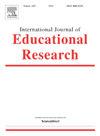Digital literacy of EFL student-teachers using empowerment outreach program: The role of engagement, cognitive learning, and performance
IF 2.5
3区 教育学
Q1 EDUCATION & EDUCATIONAL RESEARCH
引用次数: 0
Abstract
Traditional schools' shortcomings drive educational innovations that emphasize technology and self-directed learning, reflected in blended learning environments and the use of tools like Moodle and Google Classroom. This shift necessitates teachers' upskilling in digital literacy to effectively integrate technology, which can enhance teaching efficacy, particularly in remote areas, while fostering student empowerment and engagement. The study involved 53 fourth-year EFL students from the University of Diyala, Iraq, and used the Learner Empowerment Scale (LES) and Cognitive Learning Scale (CLS) to measure the impact of a six-week outreach program on their technology use in teaching. Results showed that the program positively influenced students' engagement and cognitive learning, with YouTube and Duolingo being the most commonly used applications, but had a limited impact on their classroom performance. Outreach programs promoting digital literacy positively impact STs' engagement and cognitive learning but have minimal effect on teaching performance, indicating a need for pedagogical training alongside technological skills. Limitations include the study's focus solely on technology, short duration, and device-related issues, suggesting future research should explore broader pedagogical integration and consider longer evaluation periods with larger, diverse samples to assess long-term efficacy and student outcomes.
使用授权外展计划的英语学生教师的数字素养:参与、认知学习和表现的作用
传统学校的缺点促使教育创新,强调技术和自主学习,反映在混合学习环境和使用工具,如Moodle和谷歌教室。这一转变需要教师提高数字素养技能,以便有效地整合技术,从而提高教学效率,特别是在偏远地区,同时促进学生赋权和参与。该研究涉及来自伊拉克迪亚拉大学的53名四年级英语学生,并使用学习者授权量表(LES)和认知学习量表(CLS)来衡量为期六周的推广计划对他们在教学中使用技术的影响。结果表明,该计划对学生的参与和认知学习产生了积极的影响,YouTube和Duolingo是最常用的应用程序,但对他们的课堂表现影响有限。促进数字素养的外展计划对STs的参与和认知学习产生了积极影响,但对教学绩效的影响微乎其微,这表明除了技术技能外,还需要进行教学培训。局限性包括该研究仅关注技术、持续时间短和设备相关问题,这表明未来的研究应探索更广泛的教学整合,并考虑更长的评估周期和更大、更多样化的样本,以评估长期疗效和学生结果。
本文章由计算机程序翻译,如有差异,请以英文原文为准。
求助全文
约1分钟内获得全文
求助全文
来源期刊

International Journal of Educational Research
EDUCATION & EDUCATIONAL RESEARCH-
CiteScore
6.20
自引率
3.10%
发文量
141
审稿时长
21 days
期刊介绍:
The International Journal of Educational Research publishes regular papers and special issues on specific topics of interest to international audiences of educational researchers. Examples of recent Special Issues published in the journal illustrate the breadth of topics that have be included in the journal: Students Perspectives on Learning Environments, Social, Motivational and Emotional Aspects of Learning Disabilities, Epistemological Beliefs and Domain, Analyzing Mathematics Classroom Cultures and Practices, and Music Education: A site for collaborative creativity.
 求助内容:
求助内容: 应助结果提醒方式:
应助结果提醒方式:


